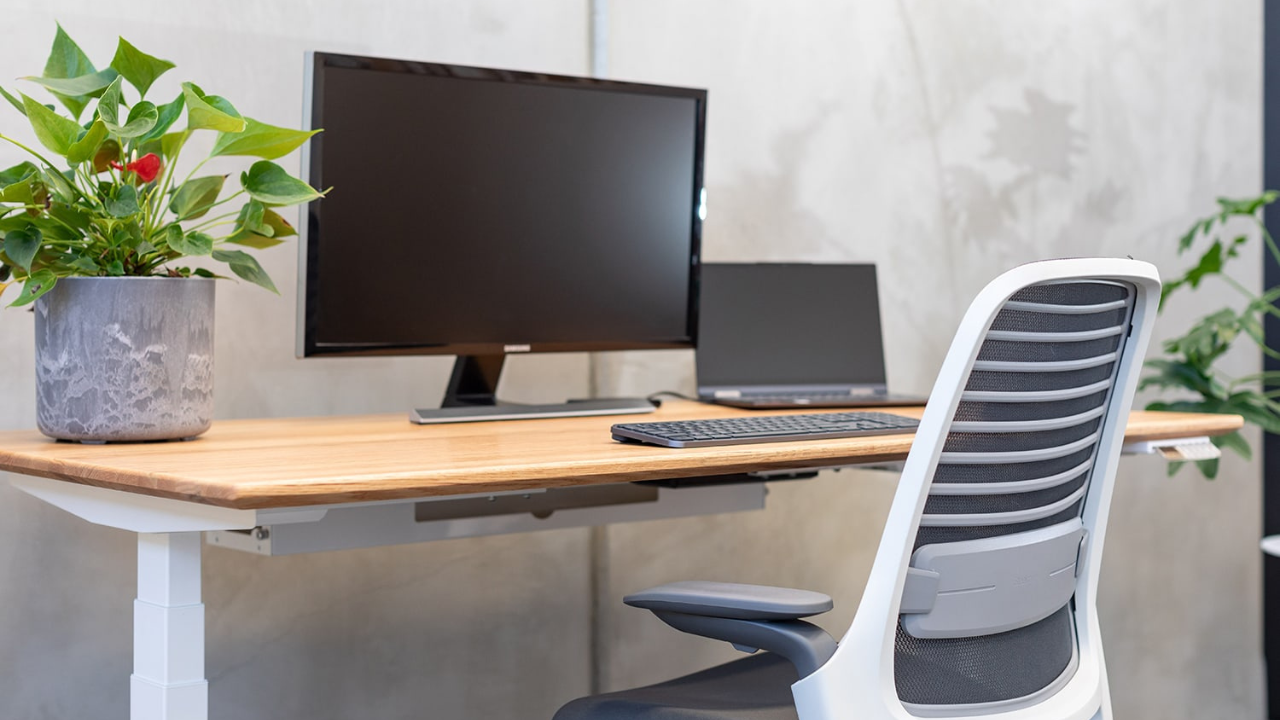A sit-stand desk’s weight capacity is an essential buying decision factor, particularly if you use multiple monitors and accessories. Your choice of standing desk should hold all your work equipment without wobbling or, even worse, losing its structural integrity.
In this blog post, I discuss the types of sit-stand desk weight limits, the ideal weight capacity for your work equipment and accessories, and what to look out for without compromising your desk's stability or safety.
Standing Desk Weight Limits
A standing desk's weight limit is the maximum weight it can safely hold. This limit often depends on the desk model and manufacturer.
However, most standing desks can support between 45 and 160 kg. To find your desk's weight limit, check its manual or product details online. Typically, the weight limit of a standing desk is in two parts:
- Dynamic or lifting weight capacity: This is the maximum weight the standing desk can lift or adjust while moving up and down. The dynamic weight capacity is often lower than the static weight limit.
- Static weight capacity: In contrast, the static weight capacity is the maximum amount of weight the desk can hold when it is not moving. This means how much weight it can support when it is in a fixed position, either raised or lowered.
When making a purchasing decision, always choose a desk with a higher dynamic weight limit. Likewise, when you’re uncertain about the type of weight limit stated, make further inquiries before purchasing.
What is a Good Sit-Stand Desk Weight Capacity?

To identify the suitable weight capacity for your work needs, you must first assess how much equipment you plan to place on it and how frequently you intend to adjust your standing desk.
Light setups that require a laptop or small monitor are ideal for a desk weight capacity between 45 and 80 kg. However, aim for a desk with at least a 100 kg capacity for dual monitors and additional accessories.
The table below shows the average weight of most sit-stand desk accessories and equipment. This should help calculate total weight usage.
| Office Equipment | Average Weight (kg) |
|---|---|
| Monitor | 5-7 |
| Keyboard, Mouse | 0.1-1 |
| All-In-One Desktop | 5-15 |
| Laptop | 2-4 |
| Printer | 2.5-10 |
| Desk Lamp | 1-2 |
| Speakers | 2-4 |
Weight Limit vs. Lifting Speed
Weight limit and lifting speed are two critical factors when considering the performance of a standing desk. Lifting speed is how quickly you can adjust the desk up or down. Generally, there is a trade-off between these two: desks with higher weight limits often have slower lifting speeds because they need more power to move heavier loads safely.
Conversely, desks with faster lifting speeds may have lower weight limits to ensure smooth and efficient operation. An example is the Standesk PRO, which has a dynamic or lifting weight capacity of 100 kg but a lifting speed of 8 cm/s—the highest I've come across.
Understanding the balance between these two helps you choose the appropriate desk per your needs, whether you prioritise lifting speed for frequent adjustments or weight capacity for holding heavy equipment.
High Weight Capacity Standing Desks

When looking for high-weight capacity standing desks, there are several models available for sturdy construction and reliable performance. Here are my top five recommendations available to Australians:
| Desk | Weight Capacity | Limit Type |
|---|---|---|
| FlexiSpot E7 | 161 kg | Static |
| UpDown PRO | 150 kg | Dynamic |
| Desky Dual | 140 kg | Dynamic |
| Stand Desk PRO | 100 kg | Dynamic |
Standing desks with high weight limits are an excellent investment if you need a robust and stable work surface for multiple monitors or heavy equipment or want a sturdy and reliable desk.

Summary
The weight capacity of a sit-stand desk depends on its design, materials, and build quality. When choosing a sit-stand desk, be sure your desk choice reflects your weight capacity and lifting speed needs.
If you already own a sit-stand desk, refer to the manufacturer's guidelines to ensure you use it within its limits for optimal performance and safety. This is essential to extend the desk’s lifespan.








